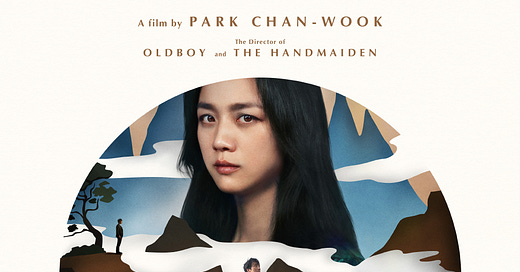Directed by Park Chan-wook
Language: Korean (Local title: 헤어질 결심)
Year: 2022
Shaun’s Rating: 4.2/5 ★
Before Watching:
Park Chan-wook, one of the most lauded directors of our day, has earned himself a third Cannes prize for his 2022 psychological thriller, this time for Best Director1. Decision to Leave is a stunning, sexy murder mystery with enough sleek editing and intrigue to captivate any noir aficionado—even one whose familiarity with Korean production stops at Squid Game. Park Chan-wook is not just a gifted storyteller, he is an unbeholden luminary, with a relentless devotion to plot and character exploration.
Park Hae-il stars as Jang Hae-jun, an insomniac detective with a… let’s say, strained long-distance “weekend marriage” to a power plant employee. Hae-jun and his partner are staffed on the case of a former immigration officer and avid recreational mountaineer who plummets from his favorite summit. The investigation is further complicated by the victim’s apathetic widow, a much younger emigrant from China named Song Seo-rae (played by the spellbinding Tang Wei) who doesn’t quite make the Decision to Grieve. Seo-rae’s unperturbed demeanor leaves the situation murky, but the evidence suggests an accident, and honestly what malfeasance could possibly happen in Busan? As an illicit romance blooms between Hae-jun and the beguiling Seo-rae, new questions are raised, and some old questions are ignored. I dislike the star-crossed lovers trope as much as the next film snob, but Park2 finds a bold and unsettling chemistry in Hae-jun and Seo-rae that becomes the driving engine of an inventive conundrum.
Park’s film is genius in many of his signature ways (poetic match-on-graphics, surgical cross-cutting, palpable suspense, etc.), but it also stands out as a study in style. A master of genre, Park Chan-wook seamlessly blends devices from melodrama, tragedy, and noir into the action. He compromises on neither speed nor character development, crafting complex and multi-dimensional figures without detracting from the film’s pacing. His personal admiration for Hitchcock is also unmissable, with numerous nods to Vertigo (1958), including a few rooftop chase scenes and Hae-jun’s obsessive surveilling of Seo-rae to hopefully understand her (not to mention his eyedrops). Unfortunately, Park does occasionally get ahead of himself, hoist by his own petard of film school gravitas—the story feels alienating at critical junctures, as the audience lacks the additional context necessary to render Hae-jun’s obsession or the murder case procedural fully believable. We experience neither Hae-jun’s longing nor suspicion in Seo-rae’s absence, and the prolonged investigation feels more contrived than diligent. The poetic impact of the human story is strong enough to keep the film from falling off a cliff, but for a pure mystery I would expect more sound fundamentals.
Decision to Leave is an ocean of mood mystique and twisted love, but it’s also just good in the traditional sense. The film is equally exhilarating and artistic, only losing a few points for its occasional fragmentation and (not unlike Vertigo) its prioritization of style over skeletal substance. Ultimately, Son Heung-min might have led Korea to victory over Portugal in the World Cup, but I’d put Park Chan-wook higher on my 2022 All Stars list.
Decision to Leave premiered at the 2022 Cannes Film Festival, where it won the Prix de la Mise en Scène (Best Director). It can now be streamed on Mubi and Prime Video, as well as seen in select American theaters.
After Watching:
My favorite motif in the film is the underscoring of human fallibility. Decision to Leave shows us again and again that our recollections may be imprecise (was Seo-rae’s dress blue or green?), and our perceptions may be blurred by subjectivity. Hae-jun doesn’t see Seo-rae clearly, and for that matter, he doesn’t really see anything clearly through his eyedrops. Seo-rae is so opaque and capricious that her top song is literally “the Mist.” The only more appropriate pairing would be “Killer Queen,” or perhaps “Free Fallin’” for her late husband…
Hae-jun misjudges Seo-rae, just as his wife misjudges him. Admittedly, the story arc of a cop trying to exonerate the wrong suspect is certainly tired in modern cinema, and the twists were not necessarily unpredictable. But, Park allows us to see how deeply emotion and obsession can warp the ace acumen of even the Benoit Blanc of Busan. The audience’s perceptions are also artificial at times, like the interrogation scenes when we experience the dialogue exclusively through mirrors or CCTV monitors. One particularly outstanding shot features Seo-rae in foreground focus, with Hae-jun’s reflection in background focus—this is physically impossible with modern cameras, but it seems that Park Chan-wook is capable of the impossible (or, at least capable of filming the scene from two different angles and digitally stitching them together).
The final scene in Decision to Leave ultimately excels in tragic symmetry and duality. Seo-rae quotes from Confucius in an early interrogation that the wise admire water while the benevolent admire mountains, thereafter noting that she herself prefers the sea; not only do Seo-rae and her late first husband both die through their respective choices, but Park ensures that the imagery is identical. Seo-rae’s life ends in front of a heap of sand, reminiscent of both a tombstone and the mountain that her husband plunged from. Seo-rae’s love for Hae-jun ends unrequited, and Hae-jun receives one final gift from Seo-rae in exchange: an unsolved mystery for his photo board. As Ipo’s fog rolls in with the tide, Hae-jun will never see her clearly again.
He previously nabbed the Grand Prix for Oldboy (2004) and the Jury Prize for Thirst (2009).
The confusion in referring to director Park vs. actor Park certainly made the Q&A at the New York Film Festival very interesting. In this instance, I’m referring to Director Park Chan-wook.















